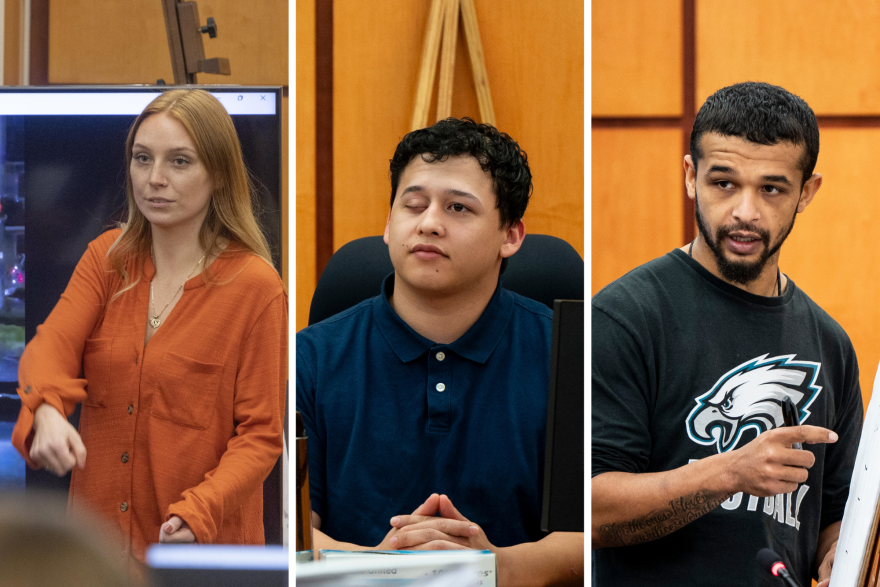A jury found three Washington police officers not guilty Thursday in the March 2020 in-custody death of Manuel "Manny" Ellis in Tacoma after a historic monthslong trial and three days of jury deliberations.
Partners Matthew Collins and Christopher Burbank were acquitted of second-degree manslaughter for fighting Ellis into hogtie restraints using elbows, a neck hold and Taser shocks. Officer Timothy Rankine was acquitted of manslaughter for pressing down on Ellis’ back while restrained face down for several minutes and pleading that he couldn't breathe.
Collins and Burbank said Ellis, a 33-year-old Black man, threatened them before attacking their patrol car and resisting arrest with extreme strength. Their attorneys said then Ellis overdosed on methamphetamine. Prosecutors argued the patrol partners lied about Ellis attacking them to justify their actions and that the officers' restraint suffocated him.
The officers await a decision about their employment from Police Chief Avery Moore, who joined the department in January 2022. Internal investigations of the officers have been on hold during their criminal proceedings. Collins no longer lives in the state and Burbank's attorneys said he is unlikely to rejoin the department. Rankine's attorneys did not respond to questions. Moore's decision on whether the officers violated policy is expected within two weeks.
Collins and Rankine took the stand during the closing days of the trial, admitting to prosecutors that they spoke to Ellis after he repeatedly said he couldn’t breathe under the weight of officers. They also told the jury that Ellis was out of control and had to be restrained for his own safety.
“In this case, undoubtedly Manny was in the wrong, but at the end of the day, his mother lost a child and his sister lost a brother and that human life is a precious thing,” Collins said on the stand.
“And so, obviously, it's, you know, it's a weight we bear as police officers when we go out and we step into this stuff every single night. But it's the worst possible outcome.”
Rankine testified, “This whole incident was tragic. I don't think any of us sitting here thought he was gonna die that night. But it happened. On a personal level it completely changed my life.”
Burbank’s attorneys did not say why he declined to take the stand.
The jury was comprised of seven men and five women. Two people appeared to be Black, one person self-identified as multi-racial, and the other nine jurors appeared to be white. The professions represented on the jury included a business executive, a minister, an accountant, a doctor, a private school teacher, an electrician, a pharmacy technician and someone who works in aerospace.
As Judge Bryan Chushcoff finished reading the verdict, Ellis' family members and supporters quickly filed out of the courtroom while holding back tears. The officers celebrated with their attorneys, then hugged family and friends in the gallery.
In a brief statement following his office's first-ever trial of local police, state Attorney General Bob Ferguson thanked the jury and said his heart went out to the Ellis family.
After speaking with the jurors, the officers' attorneys told reporters that the jury was conflicted about expert medical testimony on Ellis' cause of death and that they had doubts about the credibility of three civilian eyewitnesses who disputed the officers' accounts of the incident.
"It's just a huge, huge sigh of relief," said Collins' attorney, Casey Arbenz. "What they've been through, not only the fact that they've been falsely charged with this horrible crime, but the way that they've been portrayed, and some of the things that have been said, by people in government, newspapers and such. It's just such a sigh of relief to know that the 12 people who actually heard the evidence said that they are not guilty, and they're not guilty of anything. So they're just thrilled. They just want to go home and hug their families."
Meanwhile, Ellis' family and supporters gathered for a vigil beside a multicolored mural of his face in Tacoma's Hilltop reading, "Justice for Manny."
"He had behaved in the most positive way a human being can by saying, 'I can't breathe, sir.' And even with all of that he doesn't achieve justice in this moment," said the family's attorney, James Bible, told KNKX.
Bible said his heart was broken for the Ellis family that he's gotten to know so well because they "worked so hard every day, for some modicum of justice, they trusted the system that had a belief that if we got into court, and the facts were told that some amount of justice would actually be achieved."
Shortly thereafter, the crowd began marching through the streets and briefly shut down an intersection.
Ellis' sister, Monet Carter-Mixon pulled construction materials into the street herself, imploring motorists to either join the protest or turn around. "They're guilty," she told the crowd.
"Do you see us crying? We know that they're guilty. We knew that they were guilty," said Jaleesa Trapp, another member of the Tacoma Action Collective.
“We are sick of this!" shouted Tacoma City Council member-elect and community organizer Jamika Scott. "We're sick of this! And if you're sick of seeing us, do better!”
Tacoma Mayor Victoria Woodards later held a somber press conference with Moore, the police chief, City Manager Elizabeth Pauli and other city officials to address the verdict.
"This verdict, undoubtedly, elicits a wide range of emotions from each and every one of us, including myself," said Woodards. Specifically, I want to acknowledge the anger, the distrust, the doubt, the fear, the hurt and the exhaustion that we as Black people have experienced as a result of the history of policing in this country."
How we got here
A Washington police officer has not been convicted of manslaughter since three Seattle officers were found guilty in the 1938 beating death of Berry Lawson, a Black hotel waiter. Spokane officer Karl Thompson Jr. was convicted on federal civil rights charges, but not manslaughter, in the 2006 killing of Otto Zehm, a disabled janitor.
In the Tacoma officers’ trial, two medical examiners, a cardiologist and a pulmonologist testified for the prosecution that the hogtie restraints and weight of officers stopped Ellis from breathing, killing him after several minutes.
Defense attorneys contended – with testimony from a part-time Madigan Army Medical Center emergency doctor – that a toxic dose of methamphetamine stopped Ellis’ enlarged heart. Pierce County Superior Court Judge Bryan Chushcoff mostly denied their attempts to argue the case was a product of politically motivated Democratic officials riding a surge in anti-police sentiment
In his closing argument, defense attorney and former Pierce County prosecutor Jared Ausserer said, “Don't let Bob Ferguson in the AG’s office or their army of attorneys or staff or their unending tax dollars, they've thrown at this case, through expert witnesses to try to get you to see what they want, hear what they want, or determine what happened as they want.”
He added, “The only thing greater than the loss of Mr. Ellis' life would be to find Officer Collins, or any of these other officers guilty based on anything except what the facts were proven in this case.”

According to legal experts, it had been nearly impossible to charge police officers in Washington for decades because state law required prosecutors to prove officers acted with “malice” or “evil intent.” Washington was the only state to use such language at the time. A 2018 citizen’s initiative, I-940, removed that barrier after nearly 60% of voters approved it.
Ellis’ case is the first to go to trial under the new law.
The Attorney General’s Office hired private attorney Patty Eakes, a former King County deputy prosecutor, to try the historic case. Eakes was also hired by King County to prosecute the first police officer charged under the new law, Auburn officer Jeffrey Nelson, in connection to the 2019 shooting death of Jesse Sarey. His trial is set for March.
Police accountability advocates say the racial justice protests of 2020 were instrumental in getting state officials to re-examine the case and bring charges.
Ellis’ name became a local rallying cry during those protests when the county medical examiner ruled his death a homicide from restraint by police several days after ex-Minneapolis officer Derek Chauvin murdered George Floyd.
Although the local law enforcement and the officers’ attorneys have attempted to distinguish Ellis’ death from Floyd’s murder, the cases drew immediate comparison because the two men, both of them Black, repeatedly told police, “I can’t breathe.” In preparation for the trial this fall, Pierce County court officials traveled to Minnesota in hopes of bringing back lessons learned from Chauvin’s trial in 2021.
Yet the cases took far different paths to the courtroom. Chauvin was charged and convicted within a year of his arrest.
Ellis’ death was effectively investigated by three separate agencies over more than a year, and his younger sister, Monét Carter-Mixon, not law enforcement, was the one who uncovered evidence that has proved foundational to the officers’ prosecution.
Shortly after the medical examiner’s homicide ruling in June 2020, Carter-Mixon found an eyewitness who saw part of the encounter between Ellis and the officers. Then, other eyewitnesses came forward. They disputed the police narrative that Ellis was violent using cellphone videos that show the officers used punches, a neck hold and a Taser to subdue Ellis.
Days later – upon news that the Sheriff’s Department failed to disclose, for three months, that a deputy had helped restrain Ellis – Gov. Jay Inslee ordered the state patrol to investigate to address concerns about a conflict of interest.
State Attorney General Bob Ferguson’s office ultimately undertook a third investigation. In May 2021, more than a year after Ellis’ death, the officers were charged, prompting the office’s first-ever criminal case against local police officers. The officers have been on paid leave since June 2020, collectively earning more than a million dollars by the time their trial began.
At the time of Ellis’ death, the Tacoma Police Department didn’t have body-worn cameras, prompting city officials to push for urgent action after years of discussing the technology. The department also didn’t have policies or formalized training around the leg restraints used to hogtie Ellis or the spit mask that may have blocked his airway. Most departments in the state have since banned hogtying and adopted strict rules for using spit hoods on the recommendation of the Attorney General’s Office.
Ferguson later ordered the review of 22 additional police deadly force investigations after determining the initial Sheriff’s Department probe of Ellis’ death violated state law on deadly force investigations. The state’s requirements are meant to ensure thorough, independent investigations when departments investigate each other’s in-custody deaths.
Ellis’ case also loomed large following the state Legislature’s 2021 session. Inslee signed a suite of police reform bills in Tacoma, including laws outlawing neck restraints and requiring officers to use “reasonable care” before using force on people and to intervene if colleagues use excessive force.
And in next year’s race for governor, Ferguson, a Democrat, is considered a frontrunner.
The Officers' Trial
After numerous delays, jury selection in the officers’ trial began Sept. 18 and lasted two weeks. Attorneys gave their opening statements on Oct. 2 and called around 30 witnesses to the stand over about nine weeks. The case went to the jury on Dec. 14.
At trial, Ellis could not be referred to as a victim and the attorneys largely stayed away from issues of race.
Chushcoff, the judge, admonished Eakes, the special prosecutor, after she twice accused the officers of treating Ellis as less than human during her closing arguments.
“When you suggest that they treat him, like an animal, like something less than human, it invokes all the stereotypes of Nazi Germany,” Chushcoff said. “And what does that do in terms of stirring people's emotions except to suggest that there's some kind of white supremacist bigoted kind of activity going on here, which you claim is not the state's position and which you claim the state has no evidence of and yet it gets introduced in this case, and it is a very serious problem.”

The judge also forbade attorneys from casting suspicion on the motivations of both local investigators and state officials. However, the officers’ attorneys did speculate about the actions of the Ellis family’s lawyer, James Bible. Bible is representing the family in its pending federal civil rights lawsuit against the city of Tacoma and had contact with two eyewitnesses before they spoke with law enforcement. Pierce County settled with the family pre-trial for $4 million.
The jury’s verdict largely hinged on whether to believe the account of the officers that Ellis attacked them or the testimony of three eyewitnesses who said Ellis had been walking on the sidewalk before an officer knocked him to the ground with his car door.
Sara McDowell, Seth Cowden and Keyon Lowery each testified that they arrived at the intersection before Collins and Burbank got out of their patrol car. They said they never saw Ellis in the intersection harassing cars or punching the patrol car, as the officers stated. McDowell and Cowden began filming on their cell phones after Ellis went to the ground.
“What they were doing wasn't right to me,” said McDowell, who screamed for the officers to stop hitting Ellis. “So I wanted to make sure that whatever happened was on tape. It wasn’t right. I’d never seen police do anything like that. It was the worst thing I’ve ever seen. It was scary. It wasn’t OK.”
Two eyewitnesses called by the officers’ attorneys testified that they never saw Ellis strike the officers or get to his feet, undermining the defense’s claims that Ellis was “manhandling” the officers even as he was handcuffed and shackled.
The defense supported the officers’ stories that Ellis attacked them with testimony from Pierce County deputies who arrested Ellis in 2015 and 2019. In both cases, Ellis was reportedly high on methamphetamine and resistant. In one instance he was hobbled, and in the other he was Tasered.

The officers’ attorneys also disputed that their clients killed Ellis, contending instead that he caused his own death by damaging his heart with habitual methamphetamine use.
Early in the trial, defense attorney Brett Purtzer’s back-and-forth with forensic pathologist Dr. Roger Mitchell about Ellis’ cause of death drew gasps from the courtroom.
“If we're talking about the fight, if I may, the fight is what killed him,” Mitchell said.
Purtzer quickly replied, “Well, the fight’s not what killed him. He killed himself by resisting officers.”
The jury also heard dueling expert testimony about the force used on Ellis and whether police officers are trained that leaving someone restrained facedown can cause them to suffocate.
Testifying for the prosecution, consultant and former Providence, Rhode Island police Capt. Jack Ryan told the jury that Collins and Burbank used excessive force in struggling with Ellis because the pedestrian wasn’t resisting violently. Ryan also said officers are trained to get people off their stomachs immediately after they’re handcuffed.
“One of the things we recognize is that when a person is struggling for breath – when they’re oxygen-starved – that they sometimes have involuntary movements that actually is not intentional resistance, but it's actually fighting for breath,” Ryan testified.
Testifying in defense of the officers, Renton police training Sgt. Chris Nielsen told the jury that police have broad discretion in their tactics and can go outside their training as long as it’s reasonable to officers at the scene. He also said use-of-force incidents are, by definition, lopsided fights.
“If someone slaps you, you might strike them or tase them, or take them to the ground,” Nielsen said. “But whatever the force, the resistance that you're getting, you have to come in a slight degree higher than that so that you're successful in detaining that person. Otherwise, you're just beating each other up. Right? Or if you come in too low, then the officer would lose and, and suffer much more serious outcomes.”
Follow KNKX's ongoing coverage of the trial and community reaction at knkx.org/tpdtrial.









